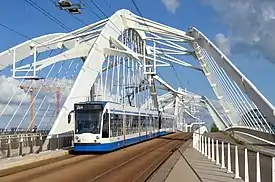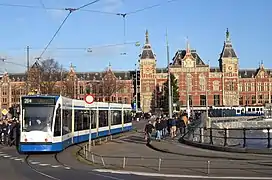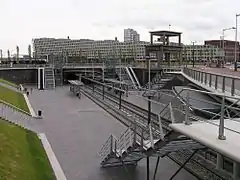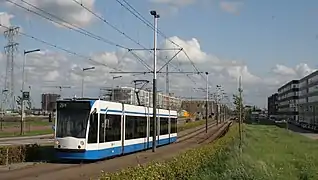IJtram
Amsterdam tram line 26, popularly known as the IJtram, is a tram line operating between Amsterdam Centraal station and the IJburg district in Amsterdam, the Netherlands. As of 2019, the IJtram was the busiest tram line in Amsterdam,[2] carrying 30,000 riders per day.[3] The 8.5-kilometre (5.3 mi)[1] line has 11 stops and a scheduled end-to-end travel time of 22 minutes.[4]
| IJtram Amsterdam tram line 26 | |||||||||||||||||||||||||||||||||||||||||||||||||||||||||||||||||||||||||||||||||||||||||||||||||||||||||||||||||||||||||||||||||||||||||||||||||||||||||||||||||||||||||||||||||||||||||||||||||||||||
|---|---|---|---|---|---|---|---|---|---|---|---|---|---|---|---|---|---|---|---|---|---|---|---|---|---|---|---|---|---|---|---|---|---|---|---|---|---|---|---|---|---|---|---|---|---|---|---|---|---|---|---|---|---|---|---|---|---|---|---|---|---|---|---|---|---|---|---|---|---|---|---|---|---|---|---|---|---|---|---|---|---|---|---|---|---|---|---|---|---|---|---|---|---|---|---|---|---|---|---|---|---|---|---|---|---|---|---|---|---|---|---|---|---|---|---|---|---|---|---|---|---|---|---|---|---|---|---|---|---|---|---|---|---|---|---|---|---|---|---|---|---|---|---|---|---|---|---|---|---|---|---|---|---|---|---|---|---|---|---|---|---|---|---|---|---|---|---|---|---|---|---|---|---|---|---|---|---|---|---|---|---|---|---|---|---|---|---|---|---|---|---|---|---|---|---|---|---|---|---|
 Coupled pair of Combino trams on Enneüs Heerma Bridge | |||||||||||||||||||||||||||||||||||||||||||||||||||||||||||||||||||||||||||||||||||||||||||||||||||||||||||||||||||||||||||||||||||||||||||||||||||||||||||||||||||||||||||||||||||||||||||||||||||||||
| Overview | |||||||||||||||||||||||||||||||||||||||||||||||||||||||||||||||||||||||||||||||||||||||||||||||||||||||||||||||||||||||||||||||||||||||||||||||||||||||||||||||||||||||||||||||||||||||||||||||||||||||
| Locale | Amsterdam | ||||||||||||||||||||||||||||||||||||||||||||||||||||||||||||||||||||||||||||||||||||||||||||||||||||||||||||||||||||||||||||||||||||||||||||||||||||||||||||||||||||||||||||||||||||||||||||||||||||||
| Termini | Amsterdam Centraal station IJburg | ||||||||||||||||||||||||||||||||||||||||||||||||||||||||||||||||||||||||||||||||||||||||||||||||||||||||||||||||||||||||||||||||||||||||||||||||||||||||||||||||||||||||||||||||||||||||||||||||||||||
| Website | GVB: Line 26 | ||||||||||||||||||||||||||||||||||||||||||||||||||||||||||||||||||||||||||||||||||||||||||||||||||||||||||||||||||||||||||||||||||||||||||||||||||||||||||||||||||||||||||||||||||||||||||||||||||||||
| Service | |||||||||||||||||||||||||||||||||||||||||||||||||||||||||||||||||||||||||||||||||||||||||||||||||||||||||||||||||||||||||||||||||||||||||||||||||||||||||||||||||||||||||||||||||||||||||||||||||||||||
| System | Amsterdam tram | ||||||||||||||||||||||||||||||||||||||||||||||||||||||||||||||||||||||||||||||||||||||||||||||||||||||||||||||||||||||||||||||||||||||||||||||||||||||||||||||||||||||||||||||||||||||||||||||||||||||
| Route number | 26 | ||||||||||||||||||||||||||||||||||||||||||||||||||||||||||||||||||||||||||||||||||||||||||||||||||||||||||||||||||||||||||||||||||||||||||||||||||||||||||||||||||||||||||||||||||||||||||||||||||||||
| Operator(s) | Gemeente Vervoerbedrijf (GVB) | ||||||||||||||||||||||||||||||||||||||||||||||||||||||||||||||||||||||||||||||||||||||||||||||||||||||||||||||||||||||||||||||||||||||||||||||||||||||||||||||||||||||||||||||||||||||||||||||||||||||
| Rolling stock | Combino | ||||||||||||||||||||||||||||||||||||||||||||||||||||||||||||||||||||||||||||||||||||||||||||||||||||||||||||||||||||||||||||||||||||||||||||||||||||||||||||||||||||||||||||||||||||||||||||||||||||||
| History | |||||||||||||||||||||||||||||||||||||||||||||||||||||||||||||||||||||||||||||||||||||||||||||||||||||||||||||||||||||||||||||||||||||||||||||||||||||||||||||||||||||||||||||||||||||||||||||||||||||||
| Opened | 31 May 2005 | ||||||||||||||||||||||||||||||||||||||||||||||||||||||||||||||||||||||||||||||||||||||||||||||||||||||||||||||||||||||||||||||||||||||||||||||||||||||||||||||||||||||||||||||||||||||||||||||||||||||
| Technical | |||||||||||||||||||||||||||||||||||||||||||||||||||||||||||||||||||||||||||||||||||||||||||||||||||||||||||||||||||||||||||||||||||||||||||||||||||||||||||||||||||||||||||||||||||||||||||||||||||||||
| Line length | 8.5 kilometres (5.3 mi)[1] | ||||||||||||||||||||||||||||||||||||||||||||||||||||||||||||||||||||||||||||||||||||||||||||||||||||||||||||||||||||||||||||||||||||||||||||||||||||||||||||||||||||||||||||||||||||||||||||||||||||||
| Number of tracks | 2 | ||||||||||||||||||||||||||||||||||||||||||||||||||||||||||||||||||||||||||||||||||||||||||||||||||||||||||||||||||||||||||||||||||||||||||||||||||||||||||||||||||||||||||||||||||||||||||||||||||||||
| Track gauge | 1,435 mm (4 ft 8 1⁄2 in) | ||||||||||||||||||||||||||||||||||||||||||||||||||||||||||||||||||||||||||||||||||||||||||||||||||||||||||||||||||||||||||||||||||||||||||||||||||||||||||||||||||||||||||||||||||||||||||||||||||||||
| Electrification | 600 V DC overhead | ||||||||||||||||||||||||||||||||||||||||||||||||||||||||||||||||||||||||||||||||||||||||||||||||||||||||||||||||||||||||||||||||||||||||||||||||||||||||||||||||||||||||||||||||||||||||||||||||||||||
| |||||||||||||||||||||||||||||||||||||||||||||||||||||||||||||||||||||||||||||||||||||||||||||||||||||||||||||||||||||||||||||||||||||||||||||||||||||||||||||||||||||||||||||||||||||||||||||||||||||||
Infrastructure
From the eastern side of Stationsplein, the square in front of Amsterdam Centraal station, line 26 runs eastbound beside the streets De Ruijterkade and Piet Heinkade within the Eastern Docklands area. The line continues through a short tunnel under Piet Heinkade, to enter the Rietlandpark stop, which lies in an open pit requiring tram riders to use stairs or lifts to go between the street and platform levels. Eastbound from Rietlandpark, trams pass through the 1.5-kilometre (0.93 mi) Piet Hein Tunnel to surface on Zeeburgereiland (NL:eiland = EN:island) where there is a tram storage yard. Proceeding further east, the tram line crosses the Enneüs Heerma Bridge onto Steigereiland and then crosses another bridge (Brug 2002) onto Haveneiland to terminate at the IJburg stop.[5][1]
The IJtram runs in a right-of-way separated from road traffic except for level crossings at cross-streets and some mixed traffic at the line's two terminal loops at Amsterdam Centraal station and at the IJburg stop.[1][6] The only rail connection between the IJtram and the rest of the tram system is at Centraal station; because of this, diversions to other tram lines are not possible in the event of a disruption along the line.[7]
The line uses coupled pairs of unidirectional Combino trams,[8] with each pair having a total length of 60 metres (200 ft).[9] Coupled trams have a crew of two, a driver on the first tram and a conductor on the second. Both sell tickets, but the GVB encourages passengers without tickets to board the second tram. Trams on the line can be scheduled to run as frequently as every 4 minutes.[10]
For safety reasons, only one coupled pair of trams is allowed in the Piet Hein Tunnel per direction of travel. In the event of a emergency, this restriction gives emergency workers easier access to the site. Trams require 3 minutes to ride through the tunnel, and trams must enter and leave the tunnel on schedule to avoid a bottleneck at the tunnel entrance.[7] All trams using the tunnel must be equipped with ATB, a Dutch implementation of Automatic Train Control.[11]
Centraal station has two stops for the IJtram. The regular stop is on the eastern half of Stationsplein on the south side of the station. An "emergency" stop (noodhalte) is located on the east or "IJ" side (IJzijde) of the station, which is used only when the regular stop is not available due to special events or construction projects.[3][12]
The IJtram has its own tram storage yard (IJtramstalling) on Zeeburgereiland near the Bob Haarmslaan tram stop. It can store up to 32 trams and handle the coupled pairs of trams used on the line. The yard has a carwash and a sand filling station for trams.[2] Major tram maintenance must be done elsewhere. Every 12 weeks, each tram must be sent to the Havenstraat depot for maintenance, and every 24 weeks to the GVB workshops in Diemen to grind flat wheels round.[9]
History
On 31 May 2005, the IJtram opened, operating as tram line 26.[1] Trams operated every 10 minutes in rush hours and every 15 minutes in the off-hours. A park and ride facility (P+R Zeeburg) also opened which, along with local residents along the line, provided ridership for the new line.[13] Also, the IJtram storage yard (IJburgstalling) had opened on Zeeburgereiland to store up to 18 trams.[8][14]
On 8 December 2017, line 26 became the first tram line in Amsterdam to stop accepting cash for fare payment on board the tram. Payment could still be made via OV-chipkaart or by a credit or debit card having a personal identification number. Because of the tunnel and the line's stand-alone status, the GVB considered line 26 to be ideal for the introduction of cashless payment on trams. GVB busses had been cashless since March 2017.[15]
Starting July 2018, the line was running up to 15 trams per hour during the morning and afternoon rush hours.[16]
In October 2019, an alternative turning circle for the IJtram was completed on the IJ side of Centraal Station for use when events such as Koningsdag or Gay Pride block the regular stop on Stationsplein. Work on the loop had started in March 2008, and was completed in time for track replacement on Stationsplein in 2020. The cost to construct the loop was 7 million euros.[3][12]
On 28 September 2020, the GVB started operating coupled pairs of trams on the IJtram. Test running of coupled pairs had started in 2017.[17][8] Due to growth in the number of residents in the IJburg area plus riders from the park-and-ride facility on Zeeburgereiland, [18] the line had reached its capacity using single trams. Coupled trams doubled that capacity. Implementing coupled trams during the COVID-19 pandemic, which reduced ridership, the GVB operated nine coupled pairs with a tenth pair held in reserve.[10]
Also on 28 September 2020, the IJtram storage yard (IJburgstalling), reopened after a renovation to increase its capacity to 32 trams and to handle coupled pairs of trams.[8][14]
Proposed expansion
By 2018, there were proposals, costing at least 330 million euros, to expand tram service to IJburg to handle traffic from 8,000 planned new residences. In one proposal, the IJtram would be extended to Centrumeiland and Strandeiland to be completed in two phases in 2023 and 2028. Another proposal was to establish a tram connection south from Zeeburgereiland over a new bridge near the existing Amsterdam Bridge (Amsterdamsebrug) which was not strong or wide enough for a new tram line. Instead of a new tram line, bus service was also being considered.[16]
Gallery
 Line 26 tram running around a loop in front of Centraal station
Line 26 tram running around a loop in front of Centraal station Rietlandpark tram stop lying between two tunnels along line 26
Rietlandpark tram stop lying between two tunnels along line 26 Line 26 running beside IJburglaan on Steigereiland
Line 26 running beside IJburglaan on Steigereiland
See also
- Amsteltram: Amsterdam tram line 25 also uses coupled pairs of trams on a right-of-way separated from road traffic.
References
- "Amsterdam (tram)". Urban Rail. Retrieved 19 January 2021.}
- "Zuidelijke IJ-oever: verbetering trambaan IJtram (lijn 26)". City of Amsterdam (in Dutch). Archived from the original on 20 January 2021. Retrieved 20 January 2021.}
- "Nieuwe noodhalte tram 26: minimaal gebruik, wel flexibel" (in Dutch). Het Parool. 15 October 2019. Archived from the original on 8 December 2019. Retrieved 20 January 2021.}
- "GVB (home page)". Gemeente Vervoerbedrijf. Retrieved 17 January 2021.}
- "Tramlijn 26 (Amsterdam)". NL.Wikipedia (in Dutch). Retrieved 10 January 2021.}
- GVB Amsterdam Tramlijn 26 Cabinerit IJburg - Centraal Station IJzijde v.v. Tram Driver 2020. YouTube. Rail Public Transport. 4 June 2019.}
- "Lijn 26: hoe staan we er nu voor?". Gemeente Vervoerbedrijf (in Dutch). 1 April 2020. Archived from the original on 17 April 2020. Retrieved 22 January 2021.}
- "Opening IJtramstalling en start gekoppeld rijden op lijn 26". Gemeente Vervoerbedrijf (in Dutch). 29 September 2020. Archived from the original on 22 October 2020. Retrieved 2 January 2021.}
- "Voorbereidingen gekoppeld rijden op lijn 26". Gemeente Vervoerbedrijf (in Dutch). 18 November 2019. Archived from the original on 22 October 2020. Retrieved 23 January 2021.}
- "GVB laat gekoppelde IJtrams vanaf september rijden: 'We doen ons uiterste best'" (in Dutch). Vervoerregio Amsterdam. 19 August 2020. Archived from the original on 18 September 2020. Retrieved 25 January 2021.}
- "Amsterdamse Combino's". Le Parisien (in Dutch). Retrieved 23 January 2021.}
- "Extra keerlus voor tram 26" (in Dutch). De Brug. 25 October 2019. Archived from the original on 30 August 2020. Retrieved 20 January 2021.}
- "Opening IJtramtrace en P+R Zeeburg". GWWsite.nl (in Dutch). 21 January 2021. Archived from the original on 21 January 2021. Retrieved 27 May 2005.}
- "IJtramstalling Zeeburgereiland Amsterdam". Qumay Metaal (in Dutch). Archived from the original on 2 January 2021. Retrieved 2 January 2021.}
- "Lijn 26 eerste Amsterdamse tramlijn zonder cash". Gemeente Vervoerbedrijf (in Dutch). 21 November 2017. Archived from the original on 22 January 2021. Retrieved 22 January 2021.}
- "330 miljoen euro voor openbaar vervoer Zeeburg en IJburg" (in Dutch). Het Parool. 21 February 2018. Archived from the original on 30 November 2020. Retrieved 24 January 2021.}
- "Dubbele trams naar IJburg als proef" (in Dutch). Het Parool. 12 May 2017. Retrieved 30 December 2020.}
- "Lijn 26: Nieuwe stalling en gekoppeld rijden officieel van start" (in Dutch). De Brug. 8 November 2020. Archived from the original on 8 November 2020. Retrieved 20 January 2021.}